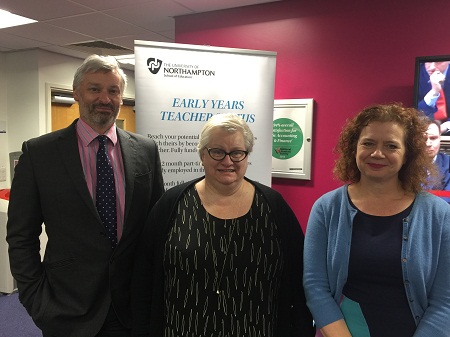Failing our children: University’s Annual Children and Young People’s Lecture debates child poverty and what can be done
Date 17.03.2016

The CEO of a leading children’s charity last night claimed that the Chancellor’s budget will do nothing for families with children or reducing child poverty.
Speaking ahead of her appearance at the University of Northampton’s 2016 Children and Young People’s lecture, Alison Garnham – CEO of Child Poverty Action Group, the leading national charity working to end poverty among children, young people and families in the UK – spoke of her worries surrounding the budget speech.
“With regards all schools becoming academies, I didn’t hear much evidence in the budget as to why it was a good idea to do it. That’s what worries me, why it is a policy without an explanation at the moment. The government has decided it is a good thing, but we do not yet have any evidence that that is the case – it is a bit of a worry from that point of view. The rest of the budget is also a bit of a worry – we saw lots of tax breaks for people with higher incomes but we’ve seen absolutely nothing for families with children so we don’t expect to see any change in child poverty thanks to this budget – which, given the Institute of Fiscal Studies last week said that child poverty will raise by 1.3m by 2020, is a bit of a surprise. It is very, very disappointing.”
According to research published in 2015 by the Department for Work and Pensions, there were 3.7 million children living in poverty in the UK in 2013-14. That’s 28 per cent of children, or 9 in a classroom of 30.
The 2016 Children and Young People’s lecture, held last night (16 March) and hosted by the University’s School of Education, debated issues surrounding child poverty, what it really means for children and what we can do about it.
Before speaking to an audience of over 100 students, staff, professionals and community leaders, Alison said: “I am delighted to be here at the University of Northampton. It is brilliant to see so many young people wanting talk about child poverty, which is a really pressing issue of today.”
In the UK, child poverty is tracked by four official indicators, including a fixed-income poverty measure, a combined income and material deprivation measure, and a measure of persistent poverty. The Child Poverty Act, passed with all-party support in 2010, commits successive governments to the eradication of child poverty by 2020.
The University’s Dr Eunice Lumsden, Head of Early Years, said: “Latest figures from the End Child Poverty charity show that, when housing costs have been taken into account, 24 per cent of Northampton’s children are living in poverty. The knock-on impact of child poverty can be startling, including poor health and educational outcomes.
Eunice continued: ““In response to this, the University of Northampton’s strategy ‘Transforming Lives, Inspiring Change’ 2015-2020, places a huge focus on making Northamptonshire the best place in the UK for children and young people’s health and wellbeing and for them to flourish and learn. Working alongside children and families to enhance life outcomes, especially in relation to mediating the impact of Child Poverty needs a holistic approach from – those working across the Health, Social Care, Early Years and Education service providers. Most importantly we need to listen to the voices of children living in poverty if we are going to provide responsive services.”
Pictured left to right: Vice Chancellor Nick Petford, Alison Garnham, Deputy Dean Helen Scott.